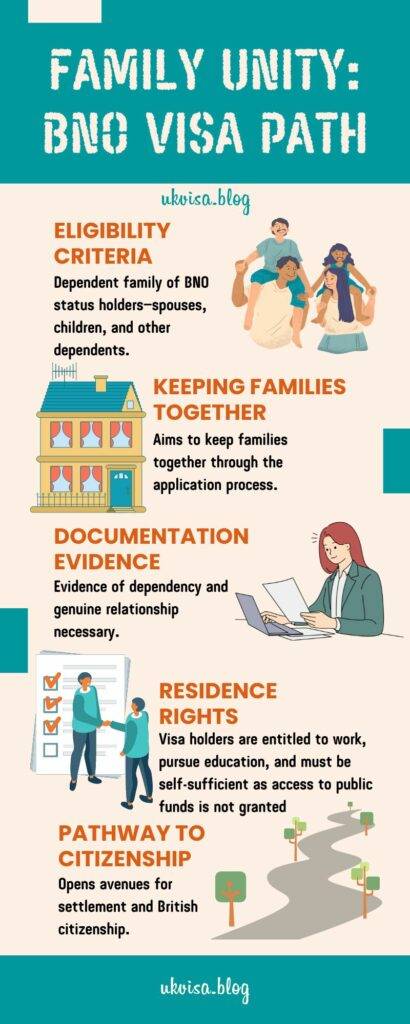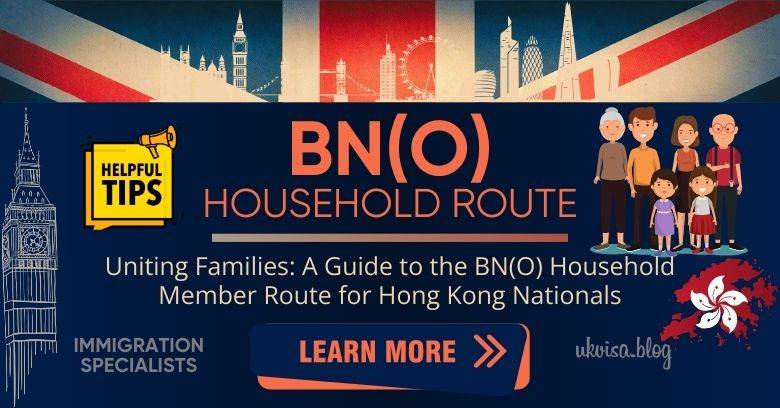A Guide to Understanding the BNO Household Member Visa Route in the UK! The UK’s BN(O) Household Member Route, established in response to Hong Kong’s evolving political scenario, offers a reunification pathway for BN(O) status holders and their close family members. This initiative underscores the UK’s commitment to supporting BN(O) citizens and their families. This guide elucidates the route’s eligibility criteria, application process, rights, and benefits, providing detailed insights for prospective applicants. Whether you’re a BN(O) status holder or a family member, this guide will navigate you through the nuances of the BN(O) Household Member Route, ensuring a well-informed approach in 2024.
Table of Contents
1. Overview: BNO Household Member Route
The UK’s introduction of the BN(O) Household Member Route reflects its commitment to supporting Hong Kong residents and their families amidst evolving challenges. This route complements the BN(O) Status Holder Route by focusing on keeping families together, offering a chance for close relatives of BN(O) status holders to join them in the UK. It underscores the UK’s understanding of the importance of familial bonds and emotional support during significant life transitions.
Eligibility for the BN(O) Household Member Route
The eligibility criteria for the BN(O) Household Member Route are designed to encompass the primary BN(O) status holder’s closest family members. Below are the details of typical BN(O) household members and the differentiation between this route and the primary BN(O) Status Holder route:
Eligible Family Members
- Dependent Spouse or Partner:
- Spouses or civil partners.
- Unmarried partners with at least two years of cohabitation with the primary BN(O) status holder.
- Dependent Children:
- Children under 18 of the primary BN(O) status holder.
- In some cases, dependent adult children due to special circumstances (e.g., medical conditions).
- Other Family Members:
- Parents or siblings may qualify in certain situations if they demonstrate a high degree of dependency on the primary BN(O) status holder.
Route Differentiation
- BN(O) Status Holder Route vs. Household Member Route:
- The BN(O) Status Holder Route is specific to individuals with BN(O) passport status.
- The Household Member Route includes close family members, even if they are not BN(O) passport holders.
- This differentiation aims to preserve family unity during relocation to the UK.
Conclusion: BNO Household Member Route
The BN(O) Household Member Route is a testament to the UK’s dedication to family unity and its commitment to support those affected by the situation in Hong Kong. By offering a pathway for family members of BN(O) status holders, the UK reinforces its stand on protecting democratic values and providing a safe haven for families seeking stability and opportunities. This route enables families to embark on their new life in the UK together, ensuring a supportive and united transition.

2. BNO Household Member Route Eligibility
The BN(O) Household Member Route caters to a broader range of applicants, with specific eligibility criteria to ensure only genuine dependents and family members can access this pathway.
Eligibility Criteria for the BN(O) Household Member Route
- Dependent Partners:
- Spouses/Civil Partners: Present marriage or civil partnership certificate.
- Unmarried Partners: Prove cohabitation in a relationship akin to marriage or civil partnership for at least two years.
- Dependent Child:
- Under 18: Generally considered dependent.
- Adult Children: Provide evidence of continued dependency, financial or due to high-level care needs (e.g., medical conditions).
- Other Dependent Family Members:
- Must demonstrate substantial evidence of dependency on the BN(O) status holder, including financial support or medical care.
Ensuring Genuine Relationships with the BN(O) Status Holder
- Proof of Relationship:
- Marriage/birth certificates, photographs, communication records to confirm authenticity.
- Joint Documents:
- For unmarried partners, evidence like joint bank accounts, property deeds, or utility bills to prove cohabitation and relationship longevity.
- Personal Statements:
- Detailed accounts of the relationship’s history and reasons for relocating to the UK.
- Third-party Affidavits:
- Letters from friends, community leaders, or acquaintances vouching for the relationship.
Key Takeaways
The eligibility criteria for the BN(O) Household Member Route emphasize the authenticity of the relationship with the BN(O) status holder and the degree of dependency. These measures are in place to prevent misuse and ensure the route serves its intended purpose of helping genuine family members of BN(O) status holders.
3. Rights and Benefits
The BN(O) Household Member Route is designed to maintain family unity and provide a conducive environment for dependents and partners of BN(O) status holders in the UK. This section outlines the various rights and benefits associated with this visa category.
Rights & Benefits of the BN(O) Household Member Route
- Work and Study:
- Permission to work in almost any sector and undertake studies in UK institutions without needing additional visas.
- Access to Healthcare:
- Eligibility to use the UK’s National Health Service (NHS) upon payment of the Immigration Health Surcharge (IHS).
- Social Services:
- Access to public funds and benefits, subject to meeting eligibility criteria.
- Path to Settlement:
- Potential to obtain Indefinite Leave to Remain (ILR) after five years, followed by eligibility for British citizenship.
- Children’s Education:
- Right for dependent children to attend UK schools, receiving the same educational standards as British nationals.
Comparison with BN(O) Status Holders
While the rights for BN(O) household members align closely with those of BN(O) status holders, it’s crucial to note that their UK residency is dependent on their relationship with the primary BN(O) status holder.
- Duration of Stay:
- Both can apply for a visa for 2.5 years (renewable) or a single period of 5 years.
- Work Restrictions:
- Neither BN(O) status holders nor their household members face general work restrictions, except in professions requiring specific security clearances.
- Access to Public Funds:
- Both categories may potentially access public funds based on individual circumstances and eligibility.
- Path to Citizenship:
- Both BN(O) status holders and their household members follow a similar path to British citizenship, involving obtaining Indefinite Leave to Remain (ILR) and meeting subsequent criteria.
Key Takeaways: Rights and Benefits
The BN(O) Household Member Route offers comprehensive benefits, mirroring those of BN(O) status holders to ensure families experience a smooth transition to life in the UK. It’s important for applicants to recognize that their rights in the UK are linked to their relationship with the primary BN(O) status holder, and any changes in the status holder’s circumstances could affect the dependents’ rights.
4. Application Process: BNO Household Member Route
The application process for the BN(O) Household Member Route can be streamlined with an understanding of each step. Below is a detailed guide to help applicants through this process.
Application Process for the BN(O) Household Member Route
- Online Application:
- Complete the application on the UK government’s website specific to the BN(O) Household Member Route.
- Application Fees & IHS:
- Pay the application fee along with the Immigration Health Surcharge (IHS) for access to the NHS.
- Biometric Information Submission:
- Provide fingerprints and photograph at a Visa Application Centre (VAC).
- Documentation Required:
- Proof of Relationship: Birth/adoption certificates, marriage/civil partnership certificates, evidence of cohabitation.
- BN(O) Status Holder’s Documentation: Proof of BN(O) status holder’s visa application or grant.
- Financial Proof: Bank statements, payslips, or an employer’s letter.
- Tuberculosis (TB) Test Results: From an approved clinic if required.
- Criminal Record Certificate: If applicable, from countries where you’ve resided for 12 months or more in the last ten years.
- English Language Proof: If required, documentation meeting the English language requirement.
- Current Passport: Include copies of any expired passports.
- Post-Application:
- Processing times vary; ensure timely submission and accuracy of all application materials for a smooth process.
Conclusion: BNO Household Member Route Application Process
Successfully navigating the BN(O) Household Member Route application process requires careful preparation and attention to detail. By following these steps and providing the necessary documentation, applicants can enhance their chances of a successful application, paving the way for a new chapter in the UK.
5. Living in the UK
Aspect of Living in the UK as a BN(O) Household Member
- Understanding British Culture:
- Explore the UK’s diverse history, traditions, and lifestyle.
- Embrace unique aspects like politeness, humor, and the cultural melting pot.
- Education and Employment:
- Familiarize yourself with the UK’s education system and job market.
- Opportunities abound in various sectors and top-ranking universities.
- Social Integration:
- Engage with local communities, attend events, and join clubs to integrate into society and form new connections.
- Weather Adaptation:
- Prepare for the UK’s unpredictable weather with appropriate clothing and an umbrella.
- Emotional Support:
- The presence of family provides emotional stability and a sense of belonging in a new environment.
- Cultural Preservation:
- Families help in maintaining cultural traditions, essential in keeping one’s heritage alive in new surroundings.
- Shared Responsibilities:
- Pooling resources and mutual support within the family helps in smoother adjustment to life in the UK.
Conclusion: The Significance of the BN(O) Household Member Route
The BN(O) Household Member Route embodies the UK’s commitment to human rights, family unity, and its historical connection with Hong Kong. It goes beyond policy to provide a lifeline for families, offering:
- Unity and Support:
- A chance for families to stay together, providing emotional and practical support during the transition.
- Dignity and Community:
- Upholds the dignity of individuals and fosters a sense of community and belonging.
- Holistic Approach:
- Recognizes the importance of cohesive and integrated communities in the UK.
This route represents not just a relocation opportunity but a compassionate gesture towards maintaining family integrity and nurturing a connected society in the UK. For BN(O) status holders, it’s a pathway to start anew with their loved ones in a country that values their contribution and respects their rights.
6. FAQs: BNO Household Member Route
-
What is the BN(O) Household Member Route?
This is a UK immigration route specifically for the family members and dependents of BN(O) status holders, enabling them to accompany or join the primary BN(O) status holder in the UK.
-
Who qualifies as a ‘household member’ under this route?
Eligible household members typically include partners, children under 18, dependent adult children (along with their partners or children), and other close relatives who rely heavily on the BN(O) status holder.
-
Is there an age restriction for children under the BN(O) Household Member Route?
Children under 18 usually qualify as dependents. Adult children may also be eligible if they co-reside with and are dependent on the BN(O) status holder.
-
Do BN(O) Household Members enjoy the same rights as BN(O) Status Holders in the UK?
BN(O) household members have similar rights, including the ability to work and study. However, their residency is linked to the BN(O) status holder’s permission to stay in the UK.
-
What is the duration of stay allowed for BN(O) Household Members in the UK?
They can choose between a 2.5-year visa and a 5-year visa, both extendable. They also have a pathway to settled status, similar to BN(O) status holders.
-
Can BN(O) Household Members apply for British citizenship?
Yes, upon obtaining settled status and meeting other criteria, they can apply for British citizenship.
-
What are the implications of changes in the relationship with the BN(O) Status Holder?
Changes like divorce or the death of the BN(O) status holder can affect their status. However, they may still be eligible for visa extension or indefinite leave to remain, depending on the circumstances and specific conditions.
-
How is the authenticity of the relationship with the BN(O) Status Holder verified?
The application process requires robust proof, such as joint bank statements, tenancy agreements, and birth certificates for children, to establish the legitimacy of the relationship.

